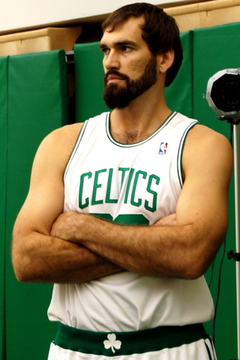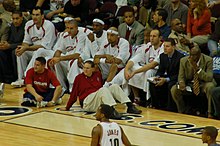Scot Pollard
| Scot Pollard | ||
 Scot Pollard (2008) |
||
| Player information | ||
|---|---|---|
| Full name | Scot L. Pollard | |
| birthday | 12th February 1975 (age 45) | |
| place of birth | Murray , Utah , United States | |
| size | 211 cm | |
| Weight | 126 kg | |
| position | Center / Power Forward | |
| college | Kansas | |
| NBA draft | 1997 , 19th pick, Detroit Pistons | |
| Jersey number | 31, 62, 66 | |
| Clubs as active | ||
| 1997–1998 Detroit Pistons 1999–2003 Sacramento Kings 2003–2006 Indiana Pacers 2006–2007 Cleveland Cavaliers 2007–2008 Boston Celtics |
||
Scot L. Pollard (born February 12, 1975 in Murray , Utah ) is a retired American basketball player who was active in the NBA between 1997 and 2008 . In his last two years as a professional he was able to celebrate his greatest successes; he surprisingly reached the NBA Finals in 2007 with the Cleveland Cavaliers , then he became NBA Champion in 2008 with the Boston Celtics . Pollard was known throughout his career for his understanding of the defensive, but also for his eccentric personality.
Childhood and youth
Scot Pollard was raised in a Mormon family as one of six children but is not religious himself. His father, who played in college basketball , got him excited about basketball at an early age. In his youth, Pollard attended high school in San Diego , where he was also active for the basketball team. After graduating from high school, he came through a basketball scholarship to the University of Kansas , which he successfully completed in 1997. Then Pollard decided to apply for the NBA draft .
NBA career
In the 1997 NBA Draft , Pollard was selected 19th by the Detroit Pistons . In his debut season, Pollard was used 33 times, with an average of 2.7 points and 2.2 rebounds per game.
After a season in Detroit, he was transferred from the Pistons to the Atlanta Hawks , who in turn passed him on to the Sacramento Kings . In Sacramento they were in the process of building a successful, playoff-capable team, which the management succeeded in doing. Due to a lockout in the 1998/99 NBA season and an injury, Pollard came in his first year with the Kings only to 16 missions from the bench. In the following years, Pollard developed into a reliable backup for Vlade Divac at the Kings and was often on the grid as a power forward . The Kings were regularly in the playoffs, but the big hit, i.e. the NBA finals, did not succeed.
In the summer of 2003, Pollard moved to the Indiana Pacers , where he had three solid years in which the Pacers could qualify for the playoffs every time. Pollard even spent the last year as a starter. After the season, Pollard became a free agent for the first time .
For the 2006/07 season , Pollard moved to the Cleveland Cavaliers , where he signed a contract for one season. At the side of superstar LeBron James , who showed one of the most outstanding performances of a single player in NBA history, the Cavaliers succeeded with Pollard as backup for Žydrūnas Ilgauskas completely surprisingly to advance into the NBA finals, where they had no chance against the San Antonio Spurs was and had to admit defeat after four games.
After the season, Pollard left the Cavaliers and moved to the Boston Celtics . At the Celtics, Pollard chose jersey number 66 and said for fun that he only chose this number because he was not allowed to take the number 666 . At the side of Paul Pierce , Kevin Garnett , Ray Allen and Rajon Rondo , Pollard became NBA Champion.
At the beginning of the season he still played regularly from the bench; However, his missions became more and more irregular and shorter, and in the finals he was finally no longer used. After the season, Pollard announced the end of his career at the age of 33. However, he said he would be available anytime an NBA team needed "a good center".
Others
On March 11, 2007, a TV camera was held at him during a timeout. Pollard looked into the camera and said, “Hey kids, do drugs” (“Hey kids, do drugs”). Although it was obvious that Pollard was not serious about this statement, it was subsequently sharply criticized in some sports programs. Pollard apologized for the statement.
Pollard was known during his career for various, sometimes flashy hairstyles, which is why he was often referred to as "White Rodman ". His hairstyles included a mohawk or a double ponytail, which earned him the nickname "Samurai Scot".
successes
- 2008 NBA champion with the Boston Celtics
Web links
- Scot Pollard - player profile on NBA.com
- Scot Pollard - player profile on basketball-reference.com
Individual evidence
- ^ Scot Pollard Stats. In: basketball-reference.com. Retrieved May 10, 2020 (English).
- ↑ Tom Reed: Pollard always has been his own man . In: Akron Beacon-Journal , October 26, 2006. Archived from the original on May 22, 2011.
- ↑ a b Scot Pollard: All about Scot . In: PlanetPollard.com . Retrieved October 12, 2014.
- ^ Gary Tanguay interviews the always entertaining Scot Pollard at Celtics Media Day , September 28, 2007
- ^ Cavs' Pollard apologizes for on-air remark . In: ESPN.com . Associated Press. October 12, 2014. Retrieved October 12, 2014.
| personal data | |
|---|---|
| SURNAME | Pollard, Scot |
| ALTERNATIVE NAMES | Pollard; Scot L. |
| BRIEF DESCRIPTION | American basketball player |
| DATE OF BIRTH | February 12, 1975 |
| PLACE OF BIRTH | Murray , Utah |
